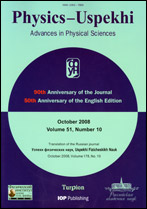|
This article is cited in 7 scientific papers (total in 7 papers)
METHODOLOGICAL NOTES
Bell's theorem without the hypothesis of locality
A. V. Belinsky
Lomonosov Moscow State University, Faculty of Physics
Abstract:
One of the Bell's assumptions in the original derivation of his inequalities was the hypothesis of locality, i.e., of the absence of the influence of two remote measuring instruments on one another. That is why violations of these inequalities observed in experiments are often interpreted as a manifestation of the nonlocal nature of quantum mechanics, or a refutation of local realism. In this paper, Bell's inequality is derived in its traditional form, without resorting to the hypothesis of locality, the only assumption being that the probability distributions are nonnegative. These probability distributions are calculated, for a specific optical experiment, in the framework of quantum theory and it is shown that they can take on negative values. This can therefore be regarded as a rigorous proof that the hypothesis of locality is not relevant to violations of Bell's inequalities. The physical meaning of the obtained results is examined.
Received: January 1, 1994
Citation:
A. V. Belinsky, “Bell's theorem without the hypothesis of locality”, UFN, 164:2 (1994), 231–234; Phys. Usp., 37:2 (1994), 219–222
Linking options:
https://www.mathnet.ru/eng/ufn939 https://www.mathnet.ru/eng/ufn/v164/i2/p231
|


|





 Contact us:
Contact us: Terms of Use
Terms of Use
 Registration to the website
Registration to the website Logotypes
Logotypes









